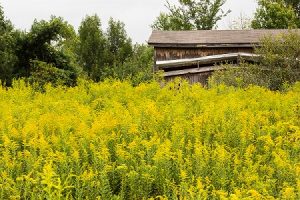 This morning I woke to the first crisp air of the fall. It is a welcome shift from the blazing heat of a summer out of place. The mixed signals from the Earth have had me off balance this month. The waning day length, the blooming goldenrod, the smell of browning leaves have all signaled that autumn is upon us. Yet, the summer’s heat persisted. A good farmer will tell you, after years of working with the land, your rhythms sync with her. She tells you when its time to plow, to plant, to weed, to harvest. Farming is timing. Yet, this year, the signals are contradictory. Leslie Cooperband of Prairie Fruits Farm & Creamery captured this sense of disquiet, “When your life and livelihood are so tied to the seasons, and you have become accustomed to the looking for, even embracing, the signs of change; the incongruence of summer bleeding into fall is disturbing.”
This morning I woke to the first crisp air of the fall. It is a welcome shift from the blazing heat of a summer out of place. The mixed signals from the Earth have had me off balance this month. The waning day length, the blooming goldenrod, the smell of browning leaves have all signaled that autumn is upon us. Yet, the summer’s heat persisted. A good farmer will tell you, after years of working with the land, your rhythms sync with her. She tells you when its time to plow, to plant, to weed, to harvest. Farming is timing. Yet, this year, the signals are contradictory. Leslie Cooperband of Prairie Fruits Farm & Creamery captured this sense of disquiet, “When your life and livelihood are so tied to the seasons, and you have become accustomed to the looking for, even embracing, the signs of change; the incongruence of summer bleeding into fall is disturbing.”
Farming is exceedingly complex, far from the “simple life” imagined by so many. But, it is an immensely rewarding life. To know the Earth so intimately. To taste the sweetness of frost kissed spinach in perfect time with season and place. To guide the shape and content of the land. To observe the disparate time scales of a radish and a pecan. These are rewards of the soul.
Yet, these rewards often come with a heavy price. The Earth is a stern mother. She demands balance and sacrifice. For the rich rewards of the soul, the farmer bargains security. The off-farm world demands guarantees. Reliable and steady income. Health insurance. Separation of work and personal finances. Regular work hours. A craving sated upon emergence. None of these are guaranteed the farmer. The farmer joyfully absorbs the risks of nature. The farmer absorbs these risk so that the rest of humanity can enjoy security.
Just as the pattern of the seasons has changed, so too has the social landscape of the farmer. Community was once rich for the farmer, now society is only loosely tethered to the producers of its sustenance. In many instances, the farmer is only considered a “hobbyist.” In bygone eras, each member of society knew what it meant to work the land. Each person understood, in their core, how closely the food system danced with ruin. A lost crop meant famine, starvation, death. In this age of perceived abundance, it is jarring to witness a blemished apple, twisted carrot, unusually large radish tossed out for lack of conformance to a standard of beauty. This has added a layer of risk in farming not found in other systems in nature. The bird selects the worm for its nutritional content, not its aesthetic appearance.
The society we inhabit would be enriched by a closer relationship to our farmers. Our farmers would be so well served by an enhanced community understanding and support of the rhythms of nature, the balance the farmer maintains.


